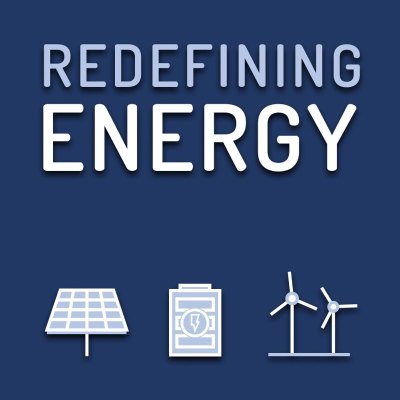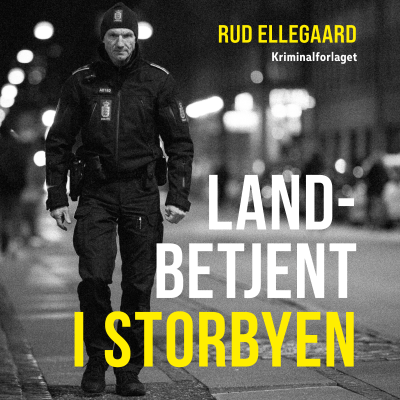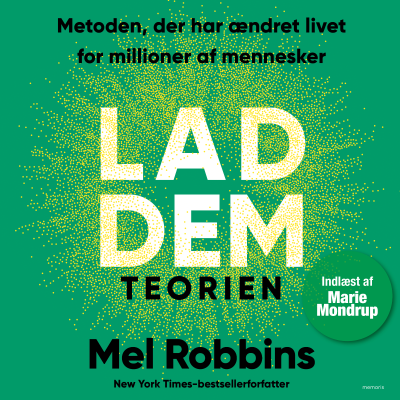
Redefining Energy
engelsk
Business
Begrænset tilbud
1 måned kun 9 kr.
Derefter 99 kr. / månedOpsig når som helst.
- 20 lydbogstimer pr. måned
- Podcasts kun på Podimo
- Gratis podcasts
Læs mere Redefining Energy
Two investment bankers weekly explore how tech, finance, markets and regulations are radically redefining the world of energy: Renewable Energy, Electric Cars, Hydrogen, Battery Storage, Digitisation...Your co-hosts: from Berlin, Gerard Reid and from London, Laurent Segalen.Our LinkedIn page: https://www.linkedin.com/company/redefining-energy/X handle: @Redef_Energy
Alle episoder
166 episoder207. E-Mobility and V-2-X - dec25
Gerard is on stage with Adele Zhao - Trina Solar and Thomas Raffeiner- The Mobility House at the Smarter E Conference. In a conversation hosted by Jonathan Gifford, they discuss about the future for the intersection of e-mobility and renewable energy. The conversation has been released as an Episode of “Powering Through” entitled The Resilience of Renewables. Participants take a closer look at the power of the e-mobility revolution, and what is needed to continue to push it forward. The uptake of e-mobility in Europe and China is discussed, along with the implications for energy storage and industry. Ultimately, the promise of a vast, mobile fleet of batteries is presented – offering a hopeful vision for emissions-free mobility and energy provision. Main topics: * What is the status of e-mobility adoption and implications for car makers * How EVs can interact with the grid and the promise for energy security * What Global EV-Battery Cooperation Might Look Like You can watch it on Youtube https://www.youtube.com/watch?app=desktop&v=M2qM58Vz9Rc
206. Renewables Repriced: Hedge Funds and Algo power trading - dec25
For much of the past two decades, renewable energy investment was viewed as a core infrastructure play—favoured by funds and long-term capital seeking predictable, government-backed cash flows. Yet the gradual phase-out of subsidies and the increasing exposure of renewables to wholesale power price volatility have eroded that stability. Are investors misreading the new market dynamics? And can renewable portfolios be optimized under a fundamentally different investment logic? FlexPower, founded in 2022 in Hamburg and, as of October 2025, fully owned by Citadel, the global hedge fund, represents this shift. The firm operates at the intersection of short-term power trading and battery optimization, deploying data-driven strategies across European markets. FlexPower exemplifies how agile, technology-led firms are reshaping power markets by leveraging algorithmic trading, high-frequency data analytics, and real-time dispatch optimization. Their approach contrasts sharply with traditional infrastructure investors who continue to rely on fixed offtake agreements and policy support. In conversation with FLexPower Managing Director Amani Joas, Laurent and Gerard examine how algorithmic trading and hedge fund participation are redefining price formation in grids increasingly dominated by intermittent renewables. The discussion highlights a structural divergence: while incumbents pursue regulatory certainty, new entrants monetize volatility itself—treating renewable assets as dynamic trading platforms rather than passive infrastructure. The energy transition is no longer just a technological revolution—it’s a financial one.
205. Elexon: The Hidden Engine of Britain’s Power Market - nov25
Running a power market isn’t just about generating electricity—it’s about making sure every kilowatt is accounted for. Someone has to calculate who owes what, make sure the rules are fair, and keep the system balanced in real time. Think of it as being an accountant, a banker, and a referee—all rolled into one. In the UK, that vital but largely invisible role is handled by Elexon. Elexon is the Balancing and Settlement Code Company (BSCCo) for Great Britain. They are the neutral heartbeat of the electricity market, making sure the lights stay on and energy imbalances are accurately billed. They provide the transparency, fairness, and precision that keeps the whole system running—and prevent anyone from gaming the market. Formerly part of National Grid, Elexon has always been independent and is owned by the 13 largest market participants. In this episode, Laurent and Gerard sit down with Peter Stanley, CEO of Elexon, to dive deep into the nuts and bolts of the balancing market. They break down why system costs have quintupled in recent years, hitting £8 billion a year, how settlement processes are being modernized, and the surprising ways AI is starting to shape the market. Elexon isn’t just about numbers—it’s the backbone of the UK’s Clean Power by 2030 plan (CP30). By keeping the system balanced and efficient, Elexon is helping drive the near-total elimination of fossil fuels from the power grid, making a cleaner, greener future possible. Get ready for a technical—but fascinating—ride behind the scenes of the UK electricity market.
204. Live from COP30 – WTFFF and Other Tales from the Amazon
Laurent sits down with Bruce Douglas, CEO of the Global Renewable Alliance, for a live conversation from COP30 in Belém, Brazil. They explore how COP30 is structured, the role of the Global Renewable Alliance, and the dynamics among participants. The 800-pound gorilla in the room—the United States—hasn’t derailed the negotiations, but one might ask: does it really matter? The real action, Bruce explains, takes place in the Blue Zone and the Green Zone, rather than in the endless debates over whether the final text will call to “phase out,” “phase down,” or “phase up” fossil fuels. With investments in clean technologies now triple those in fossil fuels, the global momentum toward renewables seems unstoppable. The COP text, increasingly, feels symbolic—if not irrelevant. Together, Laurent and Bruce celebrate the ongoing success of bottom-up implementation and the steady deployment of proven technologies, rather than top-down grand initiatives. They also touch on a new forestry initiative, TFFF—dubbed “WTF-FF” by Laurent—which, they suspect, may fade away like tears in the rain. Packed with anecdotes about the Amazon rainforest, chaotic logistics, Saudi Arabia’s surprising investments in boxing, and other quirky insights, this episode strikes an optimistic tone. Whatever COP30’s final declaration may say, one thing is clear: renewables have already won.
203. Peak Solar - nov25
Solar energy has experienced explosive growth over the past five years — doubling in capacity outside of China and quadrupling within China. But with this rapid expansion come new concerns: Are we scaling too quickly? And is the proliferation of solar now starting to strain power grids, creating more problems than solutions? Enter the concept of the “3 Cs” — Congestion, Curtailment, and Cannibalization — a term coined by Richard Sverisson at Montel. It captures the growing pains of an energy system being transformed at unprecedented speed. To unpack this, Laurent and Gerard welcome one of the world’s leading voices in solar energy: Sam Wilkinson, Head of Renewables at S&P Global Commodity Insights. Sam leads a team of 20 global experts focused on analysing and forecasting trends across renewable energy markets, policy, and infrastructure. Their insights, developed in close collaboration with industry stakeholders, are critical for understanding where the solar market is heading. Notably, Sam and his team are forecasting a 100GW decline in new solar capacity in 2026 compared to 2025 — introducing the idea of "Peak Solar." In this conversation, we explore what “peak solar” really means: its causes, how it might unfold, and the ripple effects on the global supply chain. But it’s not all bad news. Market consolidation, geographic diversification, and ongoing innovation in solar technology are helping the industry navigate challenges. As costs continue to fall and accessibility improves, solar remains a cornerstone of the global energy transition. Expect a technical yet insightful discussion on the current headwinds — and future opportunities — in the solar energy sector.
Vælg dit abonnement
Begrænset tilbud
Premium
20 timers lydbøger
Podcasts kun på Podimo
Gratis podcasts
Opsig når som helst
1 måned kun 9 kr.
Derefter 99 kr. / måned
Premium Plus
100 timers lydbøger
Podcasts kun på Podimo
Gratis podcasts
Opsig når som helst
Prøv gratis i 7 dage
Derefter 129 kr. / month
1 måned kun 9 kr. Derefter 99 kr. / måned. Opsig når som helst.

































